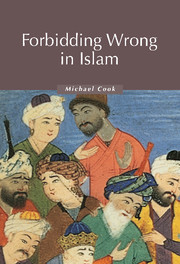Book contents
- Frontmatter
- Contents
- Preface
- Map
- 1 Introduction
- 2 The elements of the duty of forbidding wrong
- 3 How is wrong to be forbidden?
- 4 When is one unable to forbid wrong?
- 5 What about privacy?
- 6 The state as an agent of forbidding wrong
- 7 The state as an agent of wrongdoing
- 8 Is anyone against forbidding wrong?
- 9 What was forbidding wrong like in practice?
- 10 What has changed for the Sunnīs in modern times?
- 11 What has changed for the Imāmīs in modern times?
- 12 Do non-Islamic cultures have similar values?
- 13 Do we have a similar value?
- Index
10 - What has changed for the Sunnīs in modern times?
Published online by Cambridge University Press: 05 June 2012
- Frontmatter
- Contents
- Preface
- Map
- 1 Introduction
- 2 The elements of the duty of forbidding wrong
- 3 How is wrong to be forbidden?
- 4 When is one unable to forbid wrong?
- 5 What about privacy?
- 6 The state as an agent of forbidding wrong
- 7 The state as an agent of wrongdoing
- 8 Is anyone against forbidding wrong?
- 9 What was forbidding wrong like in practice?
- 10 What has changed for the Sunnīs in modern times?
- 11 What has changed for the Imāmīs in modern times?
- 12 Do non-Islamic cultures have similar values?
- 13 Do we have a similar value?
- Index
Summary
The doctrines of forbidding wrong that we examined in previous chapters form part of a medieval scholastic heritage. Such heritages excite the fascination, and sometimes the wonder, of historians, but as living traditions they are no longer really at home in the modern world. What actually becomes of them depends on a range of factors that have little to do with their intrinsic intellectual merits. They may, for example, be dismissed as irrelevant and forgotten, or relegated to iconic status, or perpetuated through institutional inertia.
In the case of the medieval Islamic scholastic heritage, the key factor is the resurgence of Islam in the second half of the twentieth century. Islamic fundamentalism, to use a convenient term, is committed to believing in the relevance of the Islamic tradition – or at least of select parts of it – to the conditions under which Muslims live in the modern world. This faith has guaranteed continuing attention to the substance of medieval doctrines of forbidding wrong. But it has not, of course, given them any immunity to the tidal forces of modernity. The effects of these forces begin to be visible in the last decades of the nineteenth century, and it is with the outcome of this process that this and the following chapter are mostly concerned.
Before we begin, we need to revisit one of the themes of the introduction of this book: religious allegiances.
- Type
- Chapter
- Information
- Forbidding Wrong in IslamAn Introduction, pp. 111 - 130Publisher: Cambridge University PressPrint publication year: 2003



